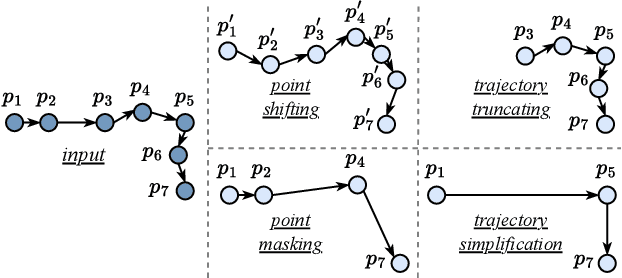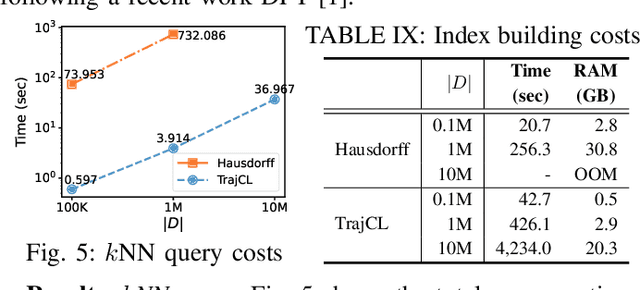Contrastive Trajectory Similarity Learning with Dual-Feature Attention
Paper and Code
Oct 11, 2022



Trajectory similarity measures act as query predicates in trajectory databases, making them the key player in determining the query results. They also have a heavy impact on the query efficiency. An ideal measure should have the capability to accurately evaluate the similarity between any two trajectories in a very short amount of time. However, existing heuristic measures are mainly based on pointwise comparisons following hand-crafted rules, thus resulting in either poor quality results or low efficiency in many cases. Although several deep learning-based measures have recently aimed at these problems, their improvements are limited by the difficulties to learn the fine-grained spatial patterns of trajectories. To address these issues, we propose a contrastive learning-based trajectory modelling method named TrajCL, which is robust in application scenarios where the data set contains low-quality trajectories. Specifically, we present four trajectory augmentation methods and a novel dual-feature self-attention-based trajectory backbone encoder. The resultant model can jointly learn both the spatial and the structural patterns of trajectories. Our model does not involve any recurrent structures and thus has a high efficiency. Besides, our pre-trained backbone encoder can be fine-tuned towards other computationally expensive measures with minimal supervision data. Experimental results show that TrajCL is consistently and significantly more accurate and faster than the state-of-the-art trajectory similarity measures. After fine-tuning, i.e., when being used as an estimator for heuristic measures, TrajCL can even outperform the state-of-the-art supervised method by up to 32% in the accuracy for processing trajectory similarity queries.
 Add to Chrome
Add to Chrome Add to Firefox
Add to Firefox Add to Edge
Add to Edge